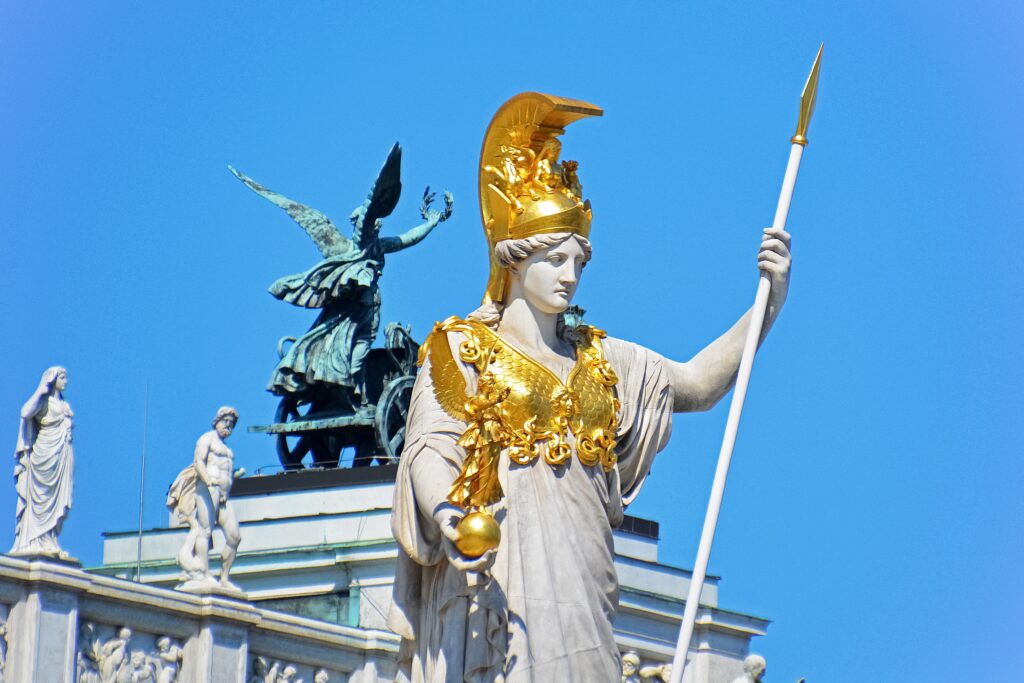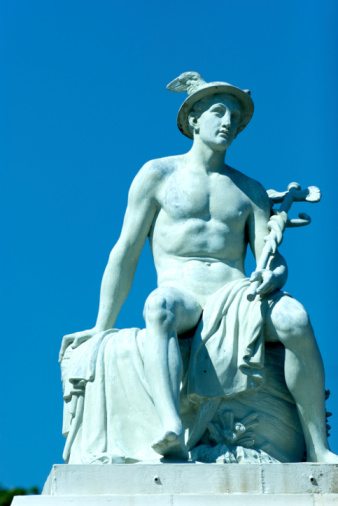So, this was a question that I got from a friend of mine that looked around on the internet to see what people might be talking about that I could answer here. Finding the question rather interesting, I kept it around for awhile and have finally decided to write on it.
As you would in doubt be well aware, Athena is the goddess of wisdom among the Olympian Gods in the Greek religion. She is probably what you would think of first when you would think of this topic.
Now to answer the question at hand, there ARE actually other deities related to wisdom and knowledge besides Athena within Greek mythology–even male gods. So I will go through and list them all for you and tell you a bit about them.
Athena And Metis

So before we actually get into other deities that do similar jobs, we have to talk about Athena herself. Athena the goddess of wisdom, courage, war (the nobler parts of it), strategy, and cities.
From the very earlier stages of her following, she has been greatly associated with the concept of the city. This counts especially for Athena’s own city Athens which dedicated its famous Parthenon to her.
So where did Athena come from and how did she get her job? Well, that involves the story of Metis, Athena’s mother.
Metis is a Titan who was the original lover of Zeus when he was in the earlier stage of his life living in hiding from his father, Cronus. Metis was Zeus’s first wife after the conclusion of the Titanomachy, however when Metis became pregnant Zeus was warned by Gaea that a son from Metis would be the one to overthrow him one day–just as he had overthrown Cronus and Cronus had overthrown Uranus.
Out of fear for his new job, Zeus made the executive decision to swallow Metis and absorb her into his being. The thing is, Metis was not just any Titan… Metis was the Titaness of Wisdom. Metis’s own name is a combination of the Ancient Greek words for wisdom and cunning.
Metis is a second generation Titan, the daughter of the first generation Titans Oceanus and Tethys. At some point as Zeus was growing up, the two met each other and became allies in the rebellion that Zeus was forming against Cronus.
Metis is responsible for creating the potions that Zeus used to incapacitate the Titans and force Cronus to vomit out all of his siblings that Cronus had swallowed so they could join forces with Zeus and be free. From there, Metis sort of shrinks into the background but we can assume she joined everyone else on the side of Zeus and was by his side in the Titanomachy.
After the war which saw an Olympian victory and a new division of the cosmos among them, Zeus takes Metis as his first wife. Metis continues to be a great counsel to Zeus and they lay together, which results in her becoming pregnant with a child.
However, Zeus becomes paranoid because he receives a prophecy from Gaea–in some versions from both Gaea and Uranus–that a male child from Metis will be the one to overthrow him. So, Zeus chooses to swallow and absorb her in a rather ironic twist, given that Metis had helped Zeus free his siblings from Cronus who had swallowed them.
For some time after that, that is the end of Metis’s story. Zeus seems to gain at least some of her powers of wisdom, he marries Hera which makes her the Queen of the Gods by his side, and he has more children with other goddesses: Ares and Hephaestus by Hera, Aphrodite by the Titaness Dione (at least in some versions, in others Aphrodite is not his child), and Artemis and Apollo by the Titaness Leto.
However, one day Zeus starts to have a headache. That headache spirals into an intense bout of suffering for Zeus that nothing can fix. So, Hephaestus strikes Zeus in the forehead really really hard.
When Hephaestus did this, Athena launched forth right out of Zeus’s forehead as a fully grown and fully armored adult goddess ready for the world. It turns out that Athena was the child of Zeus and Metis and had been born inside of Zeus’s forehead, finally surfacing forth from it much later.
Being both the child of the Titaness of wisdom and born from the mind of the king of the gods, Athena was born right into her role of goddess of wisdom–in a way taking over right where her mother would have left off with the role. Athena would join the ranks of the Olympians and begin taking part in a lot of myths thereafter.
Athena would play an often pivotal role throughout mythology aiding heroes such as Perseus, Jason, Bellerophon, and even the incredible Heracles. In the Iliad and the Odyssey, Athena would assist even more heroes such as Diomedes and Odysseus.
Athena actually played a role in starting the events of the Trojan War, depicted in the Iliad and the Odyssey, by feuding with Hera and Aphrodite over the golden apple of discord. To try to win the apple, Athena offered Paris incredible knowledge and expert military strategy, but in the end he chose Aphrodite–who offered him the love of the most beautiful woman.
Koios And Phoebe
While Metis was the Titaness of wisdom, she was not the only Titan related to knowledge. Koios and Phoebe, who are both a couple and part of the original generation of Titans, are also associated with knowledge.
Koios, the Titan of the North, is associated with rational knowledge and research. When you research something, you invoke the power of Koios. The actions of gathering knowledge and seeking out knowledge in doing things like reading and exploring are all within the domain of Koios.
Koios joined forces with Cronus, his younger brother, to overthrow Uranus and after that he was part of Cronus’s ruling entourage in his age of the world. After the overthrow of Cronus, Koios was sent along with him and the rest of their side (minus a few exceptions) into Tartarus where they were chained up to remain imprisoned as a punishment by the Olympians.
Phoebe is the Titan of “bright knowledge” which is knowledge related to things that are spiritual and prophetic, like divination. Phoebe and Koios are together in love and they have children such as Leto and Asteria, who mother Artemis & Apollo and Hekate respectively.
Phoebe did not participate in the Titanomachy, as most female Titans did not, and thus had nothing to be punished for. She remained up in Heaven and, essentially, retired–passing on her duties to her grandchildren: Apollo and Artemis.
Apollo

Apollo, as has been previously discussed, is the son of Zeus and Leto. Apollo also has a twin sister that we have also discussed named Artemis.
Apollo has a lot of roles: he drives the sun chariot to pull the sun across the sky, he is an incredible archer, he can heal others. One of Apollo’s roles though is that he inherited Phoebe’s ability for prophetic knowledge. In addition to that, Apollo also has jurisdiction over education and knowledge related to music, dance, and poetry.
Similar to how Athena helped heroes on the Greek side of the Trojan War, Apollo helped heroes on the Trojan side of the Trojan War such as Aeneas and Hector.
Hermes

Hermes is another one of the Olympian Gods. Hermes is the messenger of the gods and serves a rather vast number of roles as a deity. One of Hermes’s roles that appears quite often in mythology is that he is a trickster, he is in fact a god of cunning, persuasion, the inventor of writing, and sometimes even credited with separating the languages.
Trickery and cleverness are things that might seem a bit morally bad by today’s society, but the ancient Greeks actually saw these as valuable qualities. They praised heroes for using their brains and their wit to overcome obstacles.
Hermes is often the one that helps these heroes in performing those tasks that require such things. In at least this aspect of wisdom, Hermes is very well represented.
Peitho
The last deity on our list of wisdom related deities is Peitho. Peitho is another daughter of Oceanus and Tethys, which makes her a sister of Metis, and she can often be found in the company of Aphrodite.
Peitho specifically reigns over persuasion, seduction, and the art of rhetoric. Rhetoric is something that was also very important to the Greeks, the entire philosophical school of Sophists were based around it.
Peitho’s art of persuasion related not just to aspects of love and sexual themes, but also to politics. She plays a very minor role in mythology as a whole but seems to have first been talked about by Sappho.